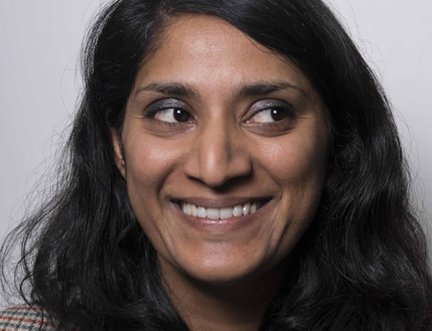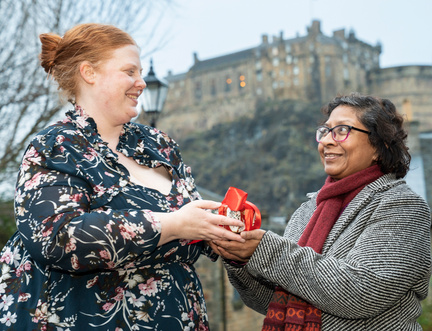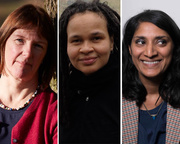A Voice of One's Own
By Chitra Ramaswamy

In 2018, we commissioned 51 authors from 25 countries to write essays exploring ideas about freedom for The Freedom Papers, a publication produced in partnership with Gutter Magazine. Read on for Chitra Ramaswamy's essay, and visit guttermag.co.uk to purchase a copy of The Freedom Papers.
‘Lock up your libraries if you like; but there is no gate, no lock, no bolt that you can set upon the freedom of my mind.’
–Virginia Woolf
I once interviewed a woman, a famous, glamorous novelist about to go stratospheric, in the private lounge of a five star hotel in London. There, amongst the plumped up cushions en pointe and the inconspicuously refilled glasses of water, we talked about the things that writers of colour tend to talk about; out of choice but also expectation. The subjects on which we are presumed to be expert and must strive to be if we are to succeed. Race, colonialism, skin (also hair!), identity, our (so-called) communities, escape, return, foreignness, and, of course, stories. Our own and the ones we choose, or rather are free, to tell. We ended up discussing a secret from our childhoods, the kind that is first kept because you can’t yourself see it. Continents apart, this woman and I had both started out writing about white people. We did not write with our own voices about our own experiences. We did not know that we could.
So in the 80s in the university town of Nsukka in south-east Nigeria, a bookish little black girl wrote Enid Blyton-esque stories about blue-eyed white children guzzling ginger beer. This, despite the fact that she was black, Nigerian (and, as you’ve probably guessed by now, Chimamanda Ngozi Adichie). And she had never tasted ginger beer. At precisely the same time, on the other side of the equator, a bookish little brown girl lay on her back in a royal London park where kings once hunted deer and dreamed of empire and wrote Anne of Green Gables-esque stories about white orphans with red hair and green eyes. This was as close to seeing herself in books, to freedom you might say, as her imagination could allow. Then what? She went home to her south Indian parents who had immigrated from Bangalore to leafy, white Richmond-upon-Thames with its glitzy riverside development, glut of blue plaques, and exalted hilltop views painted by Turner and overlooked by Mick Jagger. To the stainless steel cups and plates from a strange place called home in the kitchen cupboards. To the sour shame of lime pickle sandwiches in her school lunchbox.
Toni Morrison wrote that ‘imagining is not merely looking or looking at… it is becoming.’ Living and writing, inhabiting the words we produce that have, in turn, produced us, cannot be prised apart. The circuitous business of finding one’s voice is intimately bound up with the pursuit of becoming oneself. Both take a lifetime. Both require personal and political freedom, but also as Morrison writes, ‘being mindful of the places where imagination sabotages itself, locks its own gates, pollutes its vision’. So becoming less shackled to notions of what I should be happened in tandem with becoming a writer, or at least a better one. (Also, bonus, a happier person.) As the gates of my imagination opened, the words started to flow. The painstaking, solitary and mysterious act of committing words to pages and reading the carefully chosen words of others freed my voice. And continue to free me. This, I think, is why writers are often outsiders. Our words are where we can be most at home. And this is why we need to know that there is a place for us in books. The simple, heartbreaking words that Adichie summoned in her TED talk titled ‘The danger of a single story’ haunt me because they voice my own unspoken experience as a child: ‘I did not know that people like me could exist in literature.’
The Anne of Green Gables years passed. I found The Bluest Eye by Toni Morrison, or I like to think it found me, then Zora Neale Hurston, and then Arundhati Roy’s The God of Small Things came out. The gates swung open. But perhaps they swung too far. I started trying to write Indian stories, or the ‘authentic’ kind I imagined posh white publishers snapping up, in which misunderstood brown women in silk saris spun chapati dough and yearned for the motherland. I felt like an immigrant in my own story. I did not speak Kannada, my parents’ language, I knew neither how asafoetida smelt nor how to spell it, and when we strung up fairy lights to celebrate Diwali in school I was winging it as much as the next white person. Meanwhile, at home while my parents watched Mahabharat on the BBC, as they seemed to do for most of the early Nineties, I listened to Madonna and David Bowie, smoked Marlborough Lights, and wrote a journal spiked with self loathing and my own shameful yearnings to be white, blonde, smaller-nosed, less hairy, anything but this. There seemed to be no space, no words, and certainly no market for this. My crisis of self made for both bad faith and bad copy.
By the time I sat opposite a superstar black writer whose own hard-won words were soon to be sampled by Beyoncé so much more had happened. Our family home had been repossessed and we no longer surveyed the world from the heady heights of Richmond hill: an outlook so representative of a certain kind of Englishness it is the only view in the country to be protected by an Act of Parliament. I had moved north, upping the ante on my outsider status by becoming an English person in Scotland on top of everything else. I had fallen in love with a woman. I had become a journalist and was trying, as I have always been trying, to write. But this time the words were coming. A strange unclassifiable memoir, as well as a baby, was gestating in my brown body. A voice, and a life.
The ‘lifetime of self-censorship that people of colour have to live’, which Reni Eddo-Lodge names so powerfully in Why I’m No Longer Talking to White People About Race, was slowly lifting. And it continues to lift every time I sit down to read or write. Every time I remind myself – and I have to remind myself – that I am who I am. That my experience is valid because it is mine. That my voice can be heard because I have one. That there is always more than one version of a story. That there are, in fact, words for this.
Copyright © 2018, Chitra Ramaswamy. All rights reserved.
Supported by the Scottish Government’s Edinburgh Festivals Expo Fund through Creative Scotland.
- 2025 Festival:
- 9-24 August
Latest News
 Communities Programme participants celebrate success of 2024
Communities Programme participants celebrate success of 2024





